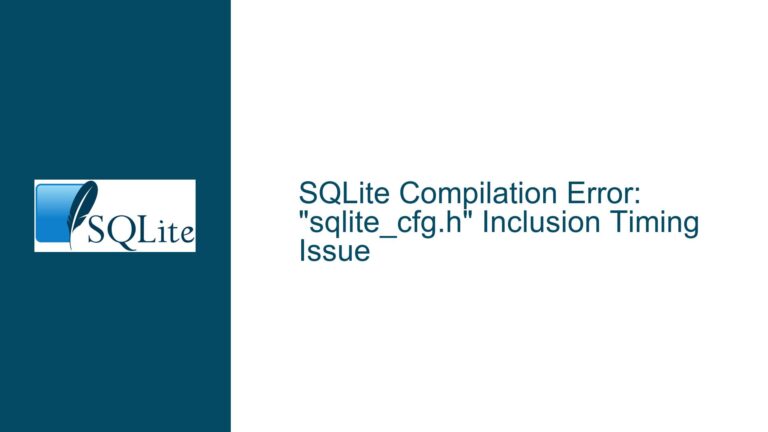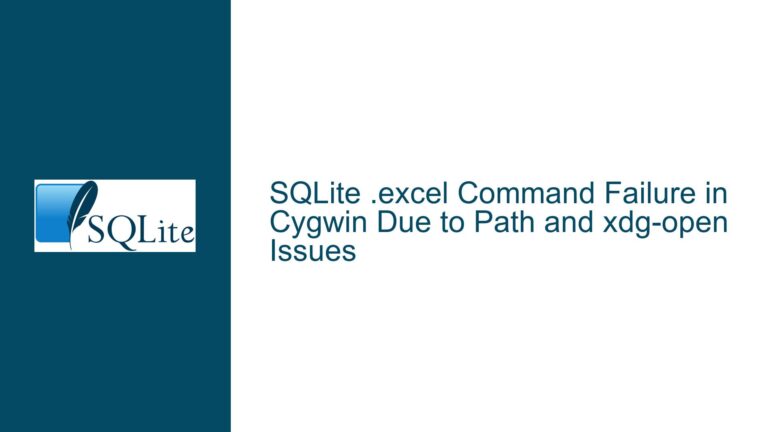SQLITE_OPEN_FULLMUTEX and Thread Safety with Shared Prepared Statements
Issue Overview: Misunderstanding Serialized Mode and Prepared Statement Concurrency
The core issue revolves around the misinterpretation of SQLite’s SQLITE_OPEN_FULLMUTEX flag and its implications for thread safety when a single prepared statement is shared across multiple threads. The user’s expectation was that enabling SQLITE_OPEN_FULLMUTEX would serialize access to a shared prepared statement such that one thread’s entire sequence of operations (binding parameters, stepping through results, and resetting the statement) would be atomic. However, SQLite’s implementation of serialized mode guarantees thread safety only at the granularity of individual API calls, not for sequences of operations. This misunderstanding led to unexpected behavior, such as queries returning zero rows due to interleaved API calls corrupting the prepared statement’s state.
Key Concepts:
SQLITE_OPEN_FULLMUTEX:
This flag ensures that all API calls on a database connection or its derived objects (e.g., prepared statements) are thread-safe. Each call (e.g.,sqlite3_bind_*,sqlite3_step,sqlite3_reset) acquires and releases internal mutexes, preventing concurrent execution of the same API function on the same object. However, it does not lock the object across multiple API calls. For example, Thread A could bind parameters to a prepared statement, and before it callssqlite3_step, Thread B could bind its own parameters, overwriting Thread A’s bindings.Prepared Statement Lifecycle:
A prepared statement (sqlite3_stmt) is stateful. Binding parameters modifies its internal state, stepping through results advances its cursor, and resetting returns it to a "ready" state. When shared across threads without synchronization, these state changes can collide. For instance:- Thread 1 binds parameter
Xand begins stepping through results. - Thread 2 binds parameter
Ybefore Thread 1 finishes stepping, overwritingX. - Thread 1’s
sqlite3_stepnow processesY, leading to incorrect results.
- Thread 1 binds parameter
Thread Safety vs. Logical Correctness:
SQLite’s serialized mode guarantees that the library’s internal data structures will not be corrupted by concurrent access. It does not ensure that application-level logic (e.g., sequences of API calls) behaves correctly when threads interleave operations. This distinction is critical: while the database engine remains intact, the application’s misuse of shared objects can still lead to logical errors.
Why This Matters:
The user’s approach—sharing a single prepared statement across threads—introduces a race condition. The DELETE ... RETURNING query’s failure to return expected rows likely occurred because one thread reset the statement (sqlite3_reset) while another was still stepping through results, prematurely finalizing the query’s execution. This violates the assumption that the prepared statement’s lifecycle (bind-step-reset) is atomic.
Possible Causes: Race Conditions and API Call Granularity
The root cause of the issue is the granularity at which SQLite applies mutex locks in serialized mode. Below are the specific factors contributing to the problem:
1. Per-API-Call Mutex Locking
In serialized mode, every API function (e.g., sqlite3_bind_text, sqlite3_step, sqlite3_reset) acquires the database connection’s mutex upon entry and releases it before returning. This ensures that two threads cannot execute the same API function on the same object concurrently. However, it does not prevent interleaving of different API calls. For example:
- Thread 1:
sqlite3_bind_int(q, 1, 100)→ Acquires mutex, binds, releases mutex. - Thread 2:
sqlite3_bind_int(q, 1, 200)→ Acquires mutex, binds, releases mutex. - Thread 1:
sqlite3_step(q)→ Processes200, not100.
The lack of a persistent lock across the bind-step-reset sequence allows threads to overwrite each other’s bindings or reset the statement prematurely.
2. Shared Prepared Statement State
A prepared statement’s state (bound parameters, cursor position) is shared across all threads using it. When Thread A binds parameters and starts stepping, Thread B can modify those parameters before Thread A completes the iteration. This is analogous to two threads unsynchronizedly modifying a shared variable: the final result depends on unpredictable timing.
3. Transactional Isolation Does Not Extend to API Calls
SQLite’s transactional isolation (e.g., BEGIN EXCLUSIVE) ensures that database changes are atomic, but it does not govern the state of prepared statements. Even if threads operate within separate transactions, sharing a prepared statement can still lead to state corruption because the statement’s internal state exists outside transactional boundaries.
4. Documentation Ambiguity
The original documentation stated that serialized mode allows SQLite to be used "with no restriction" across threads, which was interpreted as guaranteeing safety for arbitrary usage patterns. However, this was a misunderstanding of "no restriction" as it pertains to API call safety, not application-level logic. The documentation has since been clarified to emphasize that individual API calls are thread-safe, but sequences of calls require external synchronization.
Troubleshooting Steps, Solutions & Fixes: Ensuring Correct Concurrency
Step 1: Diagnose Thread Interference
Reproduce the issue under controlled conditions:
- Add logging to trace the sequence of API calls (bind, step, reset) from each thread.
- Check for overlapping executions where one thread’s
sqlite3_bindorsqlite3_resetinterrupts another thread’ssqlite3_step.
Step 2: Apply Synchronization Mechanisms
Choose one of the following strategies to eliminate race conditions:
Solution 1: Use Per-Thread Prepared Statements
- Approach: Create a separate prepared statement (
sqlite3_stmt) for each thread. - Implementation:
// Global database connection (opened with SQLITE_OPEN_FULLMUTEX) sqlite3 *db; // Thread-local prepared statement thread_local sqlite3_stmt *q; void thread_init() { sqlite3_prepare_v2(db, "DELETE FROM t WHERE id = ? RETURNING *;", -1, &q, NULL); } void thread_work() { sqlite3_bind_int(q, 1, thread_id); while (sqlite3_step(q) == SQLITE_ROW) { /* Process results */ } sqlite3_reset(q); } - Advantages: Eliminates shared state; each thread operates independently.
- Drawbacks: Increases memory usage slightly. Use
sqlite3_prepare_v3withSQLITE_PREPARE_PERSISTENTto reuse the underlying SQL bytecode.
Solution 2: Wrap Sequences in Application-Level Mutexes
- Approach: Use a mutex to enforce exclusive access to the prepared statement during bind-step-reset sequences.
- Implementation:
pthread_mutex_t stmt_mutex = PTHREAD_MUTEX_INITIALIZER; void thread_work() { pthread_mutex_lock(&stmt_mutex); sqlite3_bind_int(q, 1, thread_id); while (sqlite3_step(q) == SQLITE_ROW) { /* Process results */ } sqlite3_reset(q); pthread_mutex_unlock(&stmt_mutex); } - Advantages: Retains the convenience of a shared prepared statement.
- Drawbacks: Introduces contention; threads may block waiting for the mutex.
Solution 3: Use Separate Database Connections
- Approach: Assign each thread its own database connection (opened in multi-thread mode).
- Implementation:
void thread_work() { sqlite3 *local_db; sqlite3_open_v2("database.db", &local_db, SQLITE_OPEN_READWRITE, NULL); sqlite3_stmt *q; sqlite3_prepare_v2(local_db, "...", -1, &q, NULL); // Use q without synchronization sqlite3_finalize(q); sqlite3_close(local_db); } - Advantages: No shared state; leverages SQLite’s multi-thread mode for better performance.
- Drawbacks: Overhead of managing multiple connections; may require WAL mode.
Solution 4: Use Connection Pooling
- Approach: Maintain a pool of database connections, each with its own prepared statements. Threads check out a connection, use it, and return it to the pool.
- Advantages: Balances resource usage and concurrency.
- Tools: Implement a custom pool or use libraries like
SQLiteCpp(C++) orrusqlite(Rust).
Step 3: Update Documentation References
Refer to the revised SQLite documentation, which now clarifies:
In serialized mode, API calls to control any SQLite database connection or any object derived from a database connection can be made safely from multiple threads. The effect on an individual object is the same as if the API calls had all been made in the same order from a single thread.
Step 4: Benchmark and Optimize
- Prepared Statement Reuse: If using per-thread statements, measure the cost of
sqlite3_prepare_v2during thread initialization. For frequently used queries, the overhead is negligible. - Mutex Performance: Profile applications using mutexes to ensure contention is acceptable. Consider atomic operations or lock-free structures for non-SQLite state.
Final Recommendation
For most applications, Solution 1 (per-thread prepared statements) combined with Solution 3 (separate connections) provides the best balance of safety and performance. Reserve shared prepared statements with mutexes for low-concurrency scenarios where statement reuse is critical. Always validate concurrency assumptions through stress testing.






